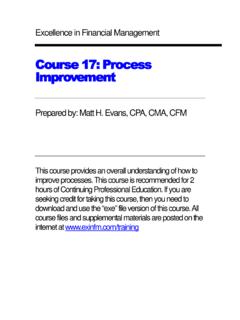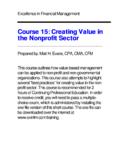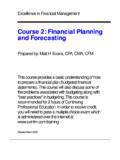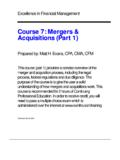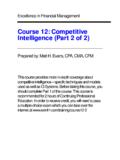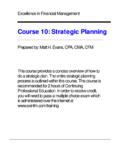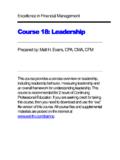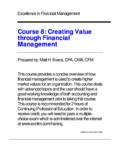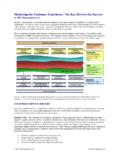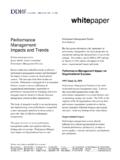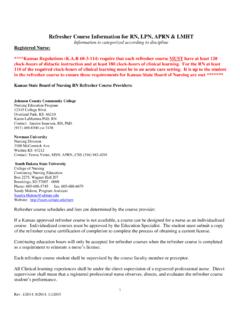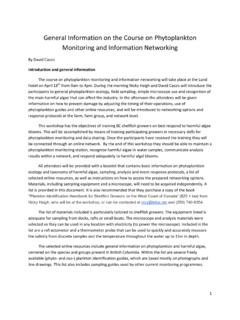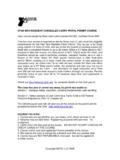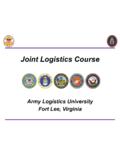Transcription of Course 12: Competitive Intelligence (PIntelligence (Part 1 ...
1 Course 12: Competitive Course 12: Competitive Course 12: Competitive Course 12: Competitive Intelligence (PIntelligence (PIntelligence (PIntelligence (Part 1 of 2) art 1 of 2) art 1 of 2) art 1 of 2) Prepared by: Matt H. Evans, CPA, CMA, CFM This Course provides an overview of how Competitive Intelligence works, including some of the techniques used to conduct Competitive Intelligence . This Course is recommended for 2 hours of Continuing Professional Education. In order to receive credit, you will need to pass a multiple-choice exam which is administered by installing the exe file version of this short Course .
2 The exe file can be downloaded from Note: This Course continues with Part 2 Analytical models, CI Systems, and more advanced topics. Excellence in Financial Management 2 Basic Concepts There is a Chinese saying: Know thy-self, know thy competition, and get it right almost every time. Know thy-self, not know thy competition, and get it right about half the time. Not know thy-self, not know thy competition, and get it wrong almost every time. We now live in a world driven by hyper-competition.
3 Hyper-competition is where too many businesses are pursuing too little business; there is not enough demand to go around for all providers of goods and services. The knowledge base for managing in this hyper- Competitive environment is called Competitive Intelligence . Competitive Intelligence is a process of giving you insights into what might happen in the near future. This process requires that we go from data to information to Intelligence . Here is a basic example: Data => Prices for our products have dropped by 5% Information => New offshore facilities have lower labor costs Intelligence => Our key competitor is about to acquire a facility in India that will.
4 The differences between data, information, and Intelligence can be subtle, but very real: Data => Unconnected pieces of information: Nice to know, but so what! Information => Increased knowledge derived by understanding the relationships of data: Interesting, but how does it relate to what I do! Intelligence => Organizing the information to fully appreciate the implications and impact on the organization: Oh really, then we better do something! Intelligence differs from data and information since it requires some form of analysis.
5 The purpose of this analysis is to derive some meaning from the piles of data and information that bury everyone. By going through analysis and filtering, we can refine it enough so that someone can act on it and understand their options, giving them an opportunity to make forward-looking decisions. When we present Intelligence to people, they can draw a conclusion and make an important decision quickly. Therefore, Competitive Intelligence should put conclusions and recommendations up front with Chapter 1 Knowledge is what you are after.
6 Information is the raw material you use. Intelligence is what finds and processes information. - The Intelligence Edge by George Friedman, Meredith Friedman, Colin Chapman and John S. Baker, Jr. 3supporting research behind the analysis. Competitive Intelligence should not simply present the facts, declaring what we found; but instead make a statement, saying this is what we believe is about to happen. Competitive Intelligence (CI) pulls together data and information from a very large and strategic view, allowing you to predict or forecast what is going to happen.
7 This in turn allows you to effectively strategize in relation to your Competitive environment. Therefore, Competitive Intelligence allows you to remain Competitive by improving your strategic decisions and this leads to better performance against your competitors. Competitive Intelligence does not attempt to collect and analyze all information for an exact picture, but attempts to get enough information so that we can tell what s going on. It s like a picture that is out-of-focus. We need to analyze enough details so we can discern the big picture and report it to management.
8 Therefore, Competitive Intelligence does not chase down all the facts, but gets enough information to draw a reasonable conclusion for immediate action. Competitive Intelligence has some basic forms, such as market research and benchmarking. However, good Competitive Intelligence goes beyond simple research. For example, Competitive Intelligence attempts to answer specific critical questions that can impact your organization: How is the competitor XYZ able to grow and capture market share? What new products will competitor ABC develop and when will they release these new products?
9 What are the core competencies of competitor DEF? Can we compete with new business lines or should we acquire another company to establish our market presence? Many equate Competitive Intelligence with other disciplines, such as business Intelligence and knowledge management. Although there are major overlaps between all of these disciplines, Competitive Intelligence tends to be very analytical, very intense, and very savvy in its approach whereas knowledge management and business Intelligence are more automated through technology and less dynamic than Competitive Intelligence .
10 However, as Competitive Intelligence becomes main-stream thinking, all of these disciplines begin to merge. So why hasn t Competitive Intelligence grown into a basic competency within most organizations? One contributing factor has to do with how Competitive Intelligence gets done. Good Competitive Intelligence requires old-fashioned analysis and filtering, somewhat like a detective who wants to solve a case you can t automate the art of The Evolution of Competitive Intelligence Key Point Intelligence should be Actionable Unless someone can take some form of action from knowledge, then your really do not have Intelligence .
